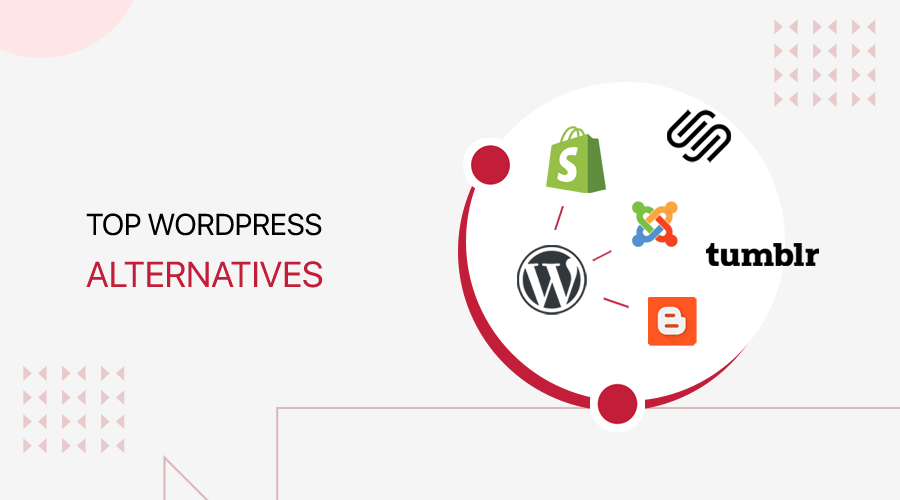
Are you looking for the best WordPress alternatives? Or not sure which WordPress competitors to use for your new site?
There are a lot of website building platforms and people choose them according to their needs. Generally, WordPress is considered one of the most popular blogging platforms and it is simple to use. But there may be a situation where WordPress may not be the ideal solution and you may need alternatives platforms.
As your website grows, you may want to change the features of your site. So, it’s necessary to choose a blogging platform that is flexible, with room to grow.
If you’re searching for alternatives to WordPress for a website, then it’s the perfect article. Here, we’re exploring the 15 best alternatives to WordPress with their features, pros, and cons.
Why WordPress Alternatives for Your Website?
WordPress is the most popular CMS and site-making tool used for creating various types of websites. You can create everything from a simple blog to a fully-fledged eCommerce store. No coding is required!
Plus, WordPress is open-source software that is available to use for free. It offers an unbelievably wide range of free themes and plugins for designing and managing your site yourself.
There are 2 flavors of WordPress – WordPress.org, the self-hosted version, and WordPress.com, a fully-hosted platform. Here, we’re talking about the fully hosted WordPress i.e. WordPress.org. Check our detailed comparison on WordPress.Com vs WordPress.Org to know more about them.
Although WordPress can meet all the major needs of your site, you may need different alternatives sometimes. For instance, you might need a fully-hosted solution so that you can focus more on your business. Or, you may just want your site to be ready fast and careless on the services provided.
To let you know, there’re platforms that particularly focus on a certain type of website. For example, Shopify is specialized in building professional online stores with dedicated features and support. So, although WordPress can also provide all these facilities, people may lean towards other alternatives.
Now, we’ll discuss 15 website builders and platforms that can be useful WordPress Alternatives.
Popular WordPress Alternatives and Competitors Competitors
Here we are going to show you the most popular WordPress alternatives. If you want to make a website but not in WordPress, then this article is for you. Go with the description, pros and cons of other platforms and decide yourself.
1. Wix

Wix is an online website that allows you to build and manage your site in a web browser, via the Wix website. It is a completely hosted site builder.
This platform has an excellent drag-and-drop builder to add images and content. Similarly, it gives a wide range of templates covering varieties of subjects from an online store to a simple portfolio. You don’t have to deal with any maintenance, upgrades, or security.
Also, Wix offers an app market that provides hundreds of apps that you can add to your site and take it to the next level.
The best part is it makes it easier to manage your website all within Wix.com. You don’t need to install any software on your web server.
Now, let’s have a look at some pros and cons of Wix:
Pros:
- Easy to use.
- No need to install Wix software.
- 24/7 support system.
- Easy drag-and-drop editor.
Cons:
- Complex website features may be missing or limited
- Templates can’t be changed once selected
- The starter plan doesn’t remove ads from your site
- Tracking and analytics require a paid plan
2. Squarespace

Squarespace is a website-building tool designed to help creative minds and website owners build incredible sites. It’s a hosted platform and a premium service.
Furthermore, it has a very stylish and responsive design that can be easily adjusted to the screen size of visitors. Not to mention that the design templates can be easily customized.
Also, it lets you use the custom domain name for branding your websites.
An interesting fact about Squarespace is that it’s a SaaS (software as a service) which provides an easy way to create and host eCommerce solutions and small websites.
Similarly, Squarespace is all in one platform that manages all your features, hosting, security measures, SEO, and more. In WordPress, managing your site is in your hands.
Let’s discuss some pros and cons of Squarespace:
Pros:
- Squarespace is all in one platform. Domain, hosting, support, maintenance, and security are included
- Customer service is available 24/7
- Easy drag and drop interface
- eCommerce friendly
Cons:
- No free plans and prices are expensive
- Limited apps and templates
- No support for third-party apps, plugins, or extensions
- Lack of advanced marketing tools
3. Shopify

Shopify is an eCommerce website builder that allows anyone to build their own online and offline store and sell their products. Likewise, it’s a fully hosted platform providing custom domain and hosting. This platform offers more than 100 premium themes, with plenty of customization possibilities.
The drag and drop editor even makes it easier to customize the look for your online store. Also, adding products, managing settings, and handling orders can be done with just a few clicks.
In order to use this builder, you need to sign up and create an account at Shopify.com. Once done, you just need to go to quick setup, and your eCommerce store is set up.
If you already have a WordPress website running, then it’s going to be quicker and cheaper. You just need to add an eCommerce component to that website. But if you don’t have a website yet then you can choose Shopify. This will help you launch an eCommerce store fast as compared to WordPress.
Here are some pros and cons of Shopify:
Pros:
- Amazing marketing tools
- Strong security
- Ease of use
- 24/7 support
Cons:
- Poor CMS
- Expensive eCommerce platform
- No Email hosting
- Additional transaction fees for using external gateways
4. Joomla

Joomla is free and open-source software that helps to create websites and powerful online applications. Also, it’s the second-largest popular content management system (CMS) available to anyone with a desire to build dynamic and strong sites.
This builder provides strong tools for managing users and the community. So, it is utilized for education, media, government, and even personal blogs and websites. Generally, this runs on most of the hosting platforms.
This platform has better built-in multilingual support as well as a more flexible content permission setting. Also, this platform provides extremely tight core security. It also allows using extensions and templates like WordPress themes and plugins.
Hence, This can be an excellent choice for you if you are a student just getting started in web design or anyone wanting to learn how to make a website. Also, you really don’t need to know about Web development or anything about programming to set up and customize your site.
Pros and cons of Joomla:
Pros:
- Open-source platform
- SEO capabilities
- Content and structure flexibility
- eCommerce Support
Cons:
- Complex to use especially for beginners.
- Only a few additional modules.
- Issues in browsing and selecting extensions.
- Limited customization.
5. Weebly

Weebly is a freemium (free and premium) builder to create a website, blog, and online store. Similarly, it’s a hosted platform.
It helps to build a website using pre-designed templates and simple drag-drop builders. Likewise, you can create customized layouts using the available elements and templates. It also has a handful of blogging features excellent for publishing posts.
This builder’s basic plan is free with limited features and customization. But if you want to upgrade your site, then a premium plan is also available. The premium plan is free of ads.
Anyone who is not familiar with online technology can also make a website easily. So, it’s suitable for small businesses or consultants looking to put up their first website.
Above all, the most desired feature of Weebly is the drag and drop builder. You can just drag your content, move, and place them around. It’s very easy to use.
Pros and cons of Weebly:
Pros:
- Adding images, videos is as easy as click,drag, and drop.
- Built-in SEO tools
- Easy customization
- Premium plans are affordable
Cons:
- Limited blogging tools
- Not the greatest backup system
- Customer support is expensive
- SEO functionality is limited
6. BigCommerce

BigCommerce is a SaaS eCommerce platform that provides everything needed to start and grow an online store. Also, it’s a fully-hosted website builder.
This platform lets you do everything yourself, including adding products, uploading photos, creating a page, discount coupons, and more. Moreover, it has an exciting feature known as Store Design through which you can see the effects of your edits in real-time.
This builder supports many payment gateways such as PayPal, Apple Pay, Stripe, and Pay with Amazon. Unlike Shopify, BigCommerce won’t charge a transaction fee for each sale that you process.
With BigCommerce, everything needed to build an online store is already built-in and all are in one place. So, it’ll be quicker to design as compared to other competitors.
Pros and cons of BigCommerce:
Pros:
- No transaction fees.
- Excellent SEO features.
- Multiple sales channels.
- Strong security.
Cons:
- Expensive Themes.
- No lite version.
- Disable multilingual features.
- Few add-ons are available.
7. Jimdo

Jimdo is a website builder that enables users to build their own websites. It focuses on one key idea i.e. ease of use in every way.
This is a code-free platform that can equally be used by the newcomer as well as web design pros. It has an AI approach that simplifies the web design process for everyone.
They use artificial intelligence to get to know the user, their business, and their goals. And then, it automatically generates a site design based on your options and requirements. Furthermore, there are plenty of responsive templates that can be used simply by drag and drop options.
The setup is fast and easy. Also, you can update and edit your website via Jimdo’s free app using your smartphone.
If you’re looking for an affordable platform this builder is the best. It has a free plan which provides all tools necessary to create a functional website. However, for upgraded features, they have paid plans.
Pros and cons of Jimdo:
Pros:
- Straightforward signup process
- Mobile-friendly themes and templates
- Great customer support
- AI-based website builder
Cons:
- No credit card gateway
- Limited templates available
- No backup settings
- Slow speed
8. Site123

Site123 is a website builder that creates a website as easily as 1-2-3. As the name suggests, you can put together a website in three steps: choose a design content, add content, and go live. In addition, provides domain name and hosting service combined.
It’s a free-to-use platform that requires no design and coding skills. Likewise, this builder is very user-friendly and comes with tons of features.
This editor is much more efficient than the traditional drag-and-drops editors. Also, It handles everything from website structures to design, to make sure you focus only on your content.
Pros and cons of Site123:
Pros:
- Ease of use
- Responsive web design
- Ready-made style and layout
- 24/7 customer support
Cons:
- Visible ads
- No better e-commerce tools
- Cannot backup, restore or download website
- Impossible to move, alter, delete anything in the template
9. Medium

Medium is a blogging platform for reading and writing different stories, articles, and creating your own publication. Besides that, it is a hosted platform that provides you with a username and hosts your blog. It is a social publishing platform that is composed of ideas, knowledge, and perspectives. Also, the publications can be accessed by the members only.
You can join it by creating a free account. After that, you can follow your favorite authors and publication, bookmark them, and also interact with their stories.
Publishing is done through your account, rather than a domain. This approach is much like posting with social media platforms and is different from a typical blog site. However, if you have blog content anywhere on the web, the medium can import it with a single click.
They give an easier learning curve from setup to publishing. So, if you want the easiest way to start writing, this is the best WordPress alternatives to choose from.
Pros and cons of Medium:
Pros:
- Strong built-in audiences
- Affordable platform
- Solid SEO power
- Easy to set up and use
Cons:
- Limited features than WordPress blog
- Less control and ownership
- Can’t add the custom domain name
- No monetization
10. Ghost

Ghost is a blogging software to simplify the process of online publishing. It’s a simple platform that allows users to create blogs, magazines, and photography websites.
This platform comes with various features for customizing page layouts, scheduling posts, and better search ranking. Likewise, it offers simple user-administration tools for assigning roles and permissions.
They make it simple to publish content online and grow an audience with email newsletters. Similarly, it provides you with options to make money from ads and premium memberships. Moreover, this is a perfect platform for those who want to focus only on blogging.
Above all, the dashboard is very straightforward and easy to understand. So, if you are a beginner in blogging you can start with this platform. You can switch to WordPress afterward to explore more possibilities.
Pros and cons of Ghost
Pros:
- Both self-hosted and fully-hosted options are available
- Simple and easy
- Built-in SEO
- Fast website speed
Cons:
- Lacks plugins
- No feedback from real users
- Limited community support
- Customization requires coding
11. Gator by HostGator

Gator is a simple website builder, aimed at those with less technical knowledge. It is released by a popular hosting service known as HostGator.
It provides a handful of pre-designed templates with the drag-and-drop editor to customize them. Also, this builder is stuffed with many features and many of them are accessible even in the cheaper plans. Besides, there are unlimited pages, storage, and bandwidth, a free domain name, 200+ mobile-friendly templates, etc. with Gator.
They also have 24/7/365 chat, email, and phone support for the customers.
If you’re looking for setting up and running your site quickly and economically, then Gator is the best. Even absolute beginners can quickly familiarize themselves with Gator without any learning curve.
Pros and cons of Gator:
Pros:
- Unlimited disk space and bandwidth
- Cheap prices
- Great social media interactions
- Easy to use
Cons:
- Not suitable for complex websites
- No email-marketing
- Doesn’t include some advanced features
- Limited help centers
12. Drupal

Drupal is a free, open-source Content Management System (CMS) that enables you to create and publish your content easily. Being a self-hosted platform like WordPress, you’ll need a web hosting and domain name to launch its the site, just like WordPress.
It has modules and themes just like themes of WordPress. Also, it offers you a back-end framework with powerful customization capability and tons of features. You might need time to get to know them properly.
Drupal powers about 2.3% of all websites in the world using its features and services. That’s pretty low compared to WordPress, 35%. However, it is used by much top government and private agencies for their websites of the world.
This builder provides a lot of flexible tools for many different tasks from non-techy users to developers. The learning curve might be a little steep and beginners may feel difficulty while setting up at the beginning.
Hence, Drupal enables you to develop fast-loading and high-performing websites. This platform is lightweight and not very resource-intensive.
Pros and cons of Drupal;
Pros:
- Strong security
- High speed
- Flexible and versatile
- Developer friendly
Cons:
- Require technical expertise
- The learning curve is complex
- Expensive
- Difficult to install
13. Magento

Magento is an open-source CMS platform that helps to create online eCommerce websites and expand business in the digital world. Also, it’s a self-hosted platform.
This platform offers a featured filled admin panel, SEO capabilities, and extraordinary functions. Moreover, the looks can be customized with professionally designed responsive eCommerce templates and themes.
Basically, this platform is designed for less technical people to create an online store by themselves. It’s easy and quick for using this platform. So, it all comes down to a fact that magneto saves your precious time.
If your business focus is on product sales of a handful of products, then this platform is the best choice. But, if you want to integrate your online store with blogs or other websites, then WordPress is the best option.
Pros and cons of Magento:
Pros:
- SEO friendly
- Optimal scalability
- Highly flexible
- Mobile friendly
Cons:
- High Cost
- Experienced technical knowledge required
- Time-consuming
- Few developers
14. Webflow

Webflow is a website builder that gives the power to design, build, and launch responsive websites. Also, it is a completely hosted platform.
This platform is the world’s first visual CMS, meaning it allows the designer to define the structure and style of the content without code. Generally, there are hundreds of professionally designed templates that can be chosen and customized.
With this builder, you can create an online store but with limited eCommerce support. However, you can also make other types of websites as a blog, portfolio, business, etc. with attractive designs.
Lastly, with superb designing features, easy setup, automatic updates, and no coding required, this might be the best WordPress alternatives for you.
Pros and Cons of Webflow:
Pros:
- Plenty of modern templates
- Ease of usage
- Responsive sites
- eCommerce support
Cons:
- Difficult learning curve
- Expensive
- No live chat or phone support
- Confusing for beginners
15. Tumblr

Tumblr is a free blogging site that allows users to post multimedia and other content to a short-form blog. It also allows sharing text, video, pictures, and own commentary.
This platform has a similar approach to social media platforms. Generally, you get to sign up and get a free account. The account’s username is the subdomain of Tumblr. As soon as you get your account, you can follow other blogs and receive their blog posts in your feeds.
Also, you’ll be eligible to publish your own content there once you get your account. Generally, it focuses on visual content. So, you can use it to post images, videos with a short descriptive test. This way of blogging is referred to as microblogging.
As a free platform, there’re not many options on themes and functionalities. However, there are considerable blogging features like blog management, scheduling posts, comment enabling, SEO, etc.
This platform is focused on microblogging and it’s easy to post graphical content. It’s so simple there are no extra options to confuse things. Whereas with WordPress, you get a fully-fledged blog with a lot of options and functionalities.
Pros:
- Multiple Blogs.
- Ease of use.
- Strong SEO benefits
- No technical knowledge
Cons:
- Misinformation
- E-commerce not supported
- Doesn’t support ads
- The mobile app is horrible
Your Choice?
WordPress is probably the best solution for every type of website. With the extensive and open-source nature of WordPress, you can build pretty much everything. However, there are many situations where one of the WordPress alternatives might suit you better.
So, which one is the best alternative among the mentioned?
Here’s the fact! There’s no claim that one platform is better than the other. The platform really depends on what kind of solution you need.
Similarly, we’ve clearly mentioned the usefulness of some WordPress alternatives along with their good and bad points. So, it’s up to you to figure out your needs and wisely choose a fitting one. For example, if you want to publish your content online, we’ve mentioned a handful of blogging platforms you can choose from.
Now, if you just want to save some setup and maintenance time, but can sacrifice control over your blog, then go for Wix or Weebly. Similarly, go for Tumblr if you just want to publish your images and videos on a social media platform.
Generally, you should have a specific reason why you’re choosing something else. If you don’t see any importance or need in choosing anything apart from WordPress, then you should probably stick with the world’s most popular CMS.
Conclusion
We hope this article helped you learn about WordPress alternatives and competitors. Did this blog benefit you? So, which is your favorite? Please leave the comment below.
From the above list, we would like to recommend Wix. Because it is one of the popular website building platform and easy to use as well.
However, you can also check our detailed article on the best blogging platforms to start your blog. Also, we recommend to read our guide on make money online.
Lastly, connect to us on Facebook and Twitter for more helpful updates.


